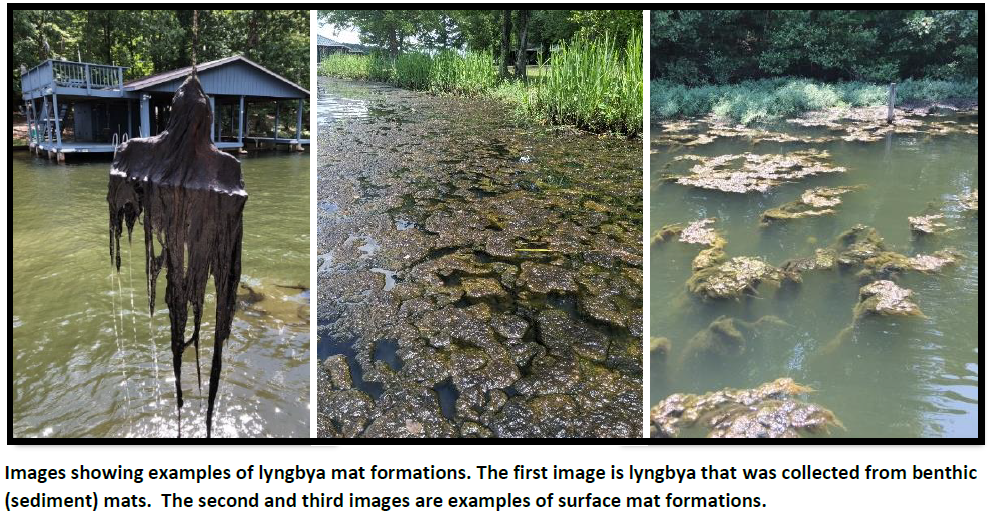WHY IS LYNGBYA PROBLEMATIC?
Lyngbya, a blue-green algae, is a filamentous cyanobacterium that has become increasingly problematic in southeastern waterways including North Carolina and Virginia. This species can produce robust, mat-like formations that persist year-round along the bottom of a system, but as summer water temperatures rise, they begin to proliferate upwards through the entire water column. These unsightly and problematic mats can negatively impact aquatic ecosystems, impede recreational activities, and depreciate the aesthetic value of waterfront properties. Lyngbya may also produce organic compounds that create foul odors and negatively alter the taste of drinking water. In some cases, this species may produce cyanotoxins which most commonly result in skin rashes after contact. Chelated-copper based algaecides remain the preferred control option for lyngbya, however effective treatment protocols require four to six consecutive monthly algaecide treatments to occur over multiple years. The success of treatments is also directly correlated with lyngbya growth and colonization, therefore, the timeline for achieving control is increased with greater infestation levels. Lyngbya may spread by attaching to watercraft, animals, or through simple water movement via floating surface mats and can re-establish itself from a small amount of living material, further compounding management efforts. Lyngbya is classified as a noxious aquatic species and is listed in the 2015 North Carolina Aquatic Nuisance Species Management Plan as a priority for management and control.
HISTORY OF LYNGBYA IN LAKE GASTON
Lyngbya was first identified in Lake Gaston in the mid 1990’s but has increased within the reservoir over the past decade. In 2012, approximately 230 acres of lyngbya were reported in Lake Gaston with continued increase to 1,377 acres in 2024. In 2017, the Lake Gaston Weed Control Council (LGWCC) began funding research focused on developing an effective management protocol for lyngbya within Lake Gaston, as well as, to better understand factors that influence its distribution and growth. In 2021, a successful lyngbya treatment program was initiated on Lake Gaston and subsequently the LGWCC funded 300 acres of treatment in 2021 and 375 acres in both 2022 and 2023. The Technical Advisory Group (TAG) has recommended the LGWCC treat up to 500 acres of lyngbya in 2024. However, treatment costs put a budgetary constraint on lyngbya acreage that the LGWCC can treat annually.
WHAT CAN YOU DO?
- If you see lyngbya around your shoreline or dock, report it to the LGWCC via their website: http://www.lgwcc.org/noxiousweeds.html
- If you have lyngbya in the lake around your community and the location is not part of the annual LGWCC treatment plan, work with your HOA or neighbors to see if private treatments are feasible.
- Make sure your elected officials are aware of your concerns with lyngbya in Lake Gaston and they are fully committed to funding management efforts to control the algae. While all 5 counties around Lake Gaston, both states and the City of Virginia Beach have committed to supporting the LGWCC to manage noxious/invasive aquatic vegetation, there have been instances where full annual funding has not been forthcoming by some jurisdictions.
- Volunteer with the Lake Gaston Association and participate in the annual Habitat Enhancement Project (occurs every June) and the annual Aquatic Vegetation Survey (occurs every fall during late August through the end of October). See the LGA website for additional information: https://www.lgancva.com/


